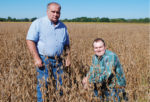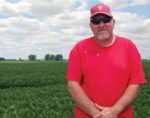Advertise Follow Us
Cover Crops
Ryegrass Seeded Early Into Corn May Be A Cool Climate Tool
Farmers in the province of Quebec seeding annual ryegrass into standing corn at the four- to nine-leaf stage find no yield drag with corn and a yield bump for soybeans.
Read More
No-Till, Covers Make CRP Acres Protected And Productive Again
Missouri farmer Jerry Morris says no-till and cover-crop mixes helped him put CRP acres back into crop production and keep his sloping fields from suffering erosion.
Read More
Making Twin-Row, No-Tilled Corn And Soybeans Pay Off
The quest for bigger yields and healthier plants led Ohio no-tiller David McNeilan to establish a twin-row system for corn and soybeans that takes advantage of higher populations and a quicker canopy.
Read More
New Rules May Open Door For Cover Crops
No-tillers who follow the NRCS’ new guidelines on termination dates can reap the benefits of covers without losing their crop insurance.
Read More









